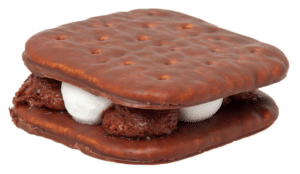Your kids are bouncing around with excitement. School activities are over-the-top Halloween focused.
Back in the day
At the risk of sounding like a real curmudgeon, I will say that nobody had costume parades, Halloween parties, or spooky extra treats in my 1960s elementary school days. Sure, we made pumpkin art projects that got pasted around the classroom, but nobody wore costumes to school. You just had to wait until after school, period. It definitely made the afternoon and evening all the more exciting!
Also back then, nobody worried much about eating candy on this holiday, other than quelling fights between siblings over candy trades. Probably because: We didn’t have GMO corn syrup (possibly more allergenic), high fructose corn syrup (a reliable mercury source), trans fats (nasty for young brains), or a bunch of other oddities now in food. And we didn’t get candy on a regular basis either.
Today? Americans spend $2.5 billion on Halloween candy.
What the what’s in this stuff today?
The amount of weird processed stuff marketed so relentlessly to moms and kids now didn’t exist either. No squeeze tube yogurts (this is basically candy), many fewer processed soft drink or soda options (candy), no Goldfish Colors (is that food?), power bars (many are sugared oats with vitamins sprinkled in, so… candy).
Halloween candy was an actual treat, not a daily, disguised-as-food lunchbox item.
Twenty-first century Halloween candy is rife with all sorts of chemicals that nobody should eat, especially kids, who are smaller and have lesser capacity to process toxins that us adults. But, it’s Halloween! If it works for your family to entirely defer the candy frenzy, of course that’s better for your kids. No way around it. But, seriously, who does that? (If you do, my hat is off to you.)
So now what?
Your options depend on your kids, and your intuition as a parent (especially, as a mom. Sorry dads. It just comes with the ovaries and uterus.). Kids avoiding colors, additives, or allergens obviously have to be especially careful: Expect any Feingold diet followers to go bonkers if they get some Haribo gummy candies.
If they do get an item that is too much for their little livers, brains, and intestines to process, you can:
GIVE A DIGESTIVE ENZYME
It will help process the food. Use a DPP-IV enzyme for a wheat/dairy transgression. Use a broad spectrum enzyme like Tri-Enza if you’re not sure. Use a phenol enzyme like No-Fenol to help excrete those colors and dyes. Chewable versions of Tri-Enza and No-Fenol are available. They may diminish reactions. Read this for a good primer on digestive enzymes.
USE ENCAPSULATED CHARCOAL
If your child can swallow capsules, use activated charcoal to bind and eliminate whatever your child just ate, in case she ate something problematic. Charcoal will grab and carry whatever is in the gut with it out in stool. Check with your doctor first. Keep in mind that it will also bind and carry any medications, supplements, or foods you do want your child to eat.
INSIST ON REAL CANDY
Pure candy is made with cane sugar, colorings from vegetable extracts, and naturally occurring, unprocessed fats or oils, rather than high fructose corn syrup, fake food dyes, and artificially manipulated fats, which, undesirable as all this sugary fatty stuff is, is actually easier for a human gut and liver to manage. There is a whole universe of organic Halloween candy out there, awaiting your perusal. This will lower your children’s toxic load to some degree.
***
If you are feeding your family healthy whole foods most of the time, barring any dangerous reactions to known trigger items, a day or two of candy gorging should not tumble your child for long.
If it does, all levity aside, this is a sign that some nutritional support and clean up is in order.
Most importantly, give your kids as safe, happy, and healthy a Halloween that you can, without demonizing the candy – which can backfire into making it a highly sought out item year round. Make the memories good, not stressful – you don’t want to go down in history as the house that gave out toothbrushes or you might get egged the next year!
A version of this article appeared on Judy’s blog: Nutrition Care for Children.
 Judy Converse, MPH, RD, LD is an expert in infant and child nutrition, growth and feeding concerns, and the potential of nutrition tools for children with autism. She’s a Fearless Parent Radio co-host and the mom of two.
Judy Converse, MPH, RD, LD is an expert in infant and child nutrition, growth and feeding concerns, and the potential of nutrition tools for children with autism. She’s a Fearless Parent Radio co-host and the mom of two.












Stick with pure candy that is { not ?} made with cane sugar….
Typo?
Hi Susan, wouldn’t that be best! The idea here is that if you’re going to be eating candy on Halloween, stick with candy that is made from least processed sweeteners, and in this instance that may include organic cane sugar – as opposed to corn syrup, high fructose corn syrup, processed agave, fructose, artificial sweeteners, dextrose – all more difficult for gut and liver to process.
No sugar, and no candy, is of course even better! But given that many kids will indulge, this is offered as a more gut-and-liver-friendly option – with a full nod to how detrimental even cane sugar can be.
I think Susan was just letting you know that there was a typo in step 3:
“Stick with pure candy that is NOT made with cane sugar, colorings from vegetable extracts, and naturally occurring, unprocessed fats or oils.”
Pure candy WOULD have the cane sugar, natural colors from vegetable extracts, and unprocessed fats and oils.
Hi, Dawn. Thanks for writing. No, this isn’t a typo! We know that many of our readers stand on their heads to avoid giving their children candy. But sometimes parents will give in… maybe Halloween is one of those times.
The point Judy is making is, IF your kids will be eating candy, she suggests that they would be better off avoiding junk ingredients, such as high fructose corn syrup and artificial dyes and flavorings, and opting instead for unprocessed ingredients found in nature, including cane sugar.
When we’re craving candy, we like to dip organic dark chocolate in an organic nut butter or raw honey. Or gluten-free s’mores!